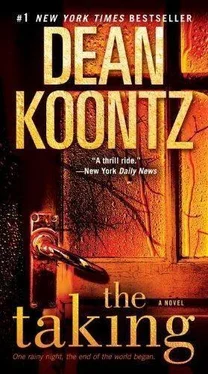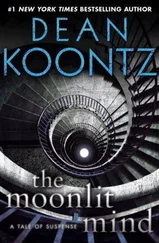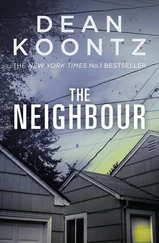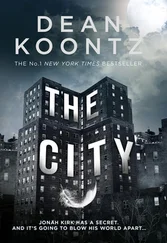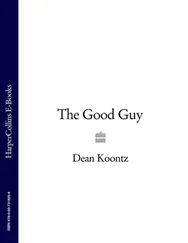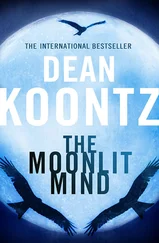More Eliot from this most unlikely quoter of verse: The red-eyed scavengers are creeping
"Again," Neil said, for though he didn't share Molly's extensive knowledge of the poet, he recognized the incongruity of those words spoken by this individual.
When Molly turned to Tewkes again, she saw in his wrenched red face and in his feverish eyes-far hotter than reflected candlelight could explain-mockery, contempt, and hatred. The arteries in his temples swelled and throbbed. His nostrils flared. His clenched jaws worked back and forth as though in his rage he were grinding his teeth into powder.
She couldn't understand how such bitter emotion could have been seeded and made to flourish in the previously pleasant tavern owner from one hour to the next. More to the point, why should this enmity be focused with such intensity on her, when she hardly knew Russell Tewkes and had never done a thing to anger or indeed even annoy him?
Raising his mug, Tewkes swilled a mouthful of beer, held it briefly in his bloated cheeks, then spat it on the floor at her feet.
Neil started to move toward Tewkes, but Molly restrained him with a touch. Virgil growled, and she silenced him merely by the whispering of his name.
If Russell Tewkes was still to any degree the man he had once been, then beyond doubt, he was something else as well. Parasite or spotted fungus, or some other corruption, had found its way into his mind and heart.
The atmosphere inside the tavern had turned. She could not smell the change or taste it as she would have tasted airborne soot, could not see it, either, but she could feel it: an insistent abrasiveness. A darkness settled through the room, as well, not one related to the power failure, not one that any number of candles could relieve, but one akin to the dark matter of the universe, which physicists are unable to see but which they know exists by virtue of its ominous gravity.
She wanted to get out of here. Quickly.
Five of the children were with Deputy Tucker Madison's group, the fighters who intended to make a fortress of the bank. They would be leaving in moments.
The sixth, a girl of nine, had joined her parents among the fence-sitters. She nervously twisted her glossy blond hair between thumb and forefinger, and her lovely sapphire eyes were haunted by all the mangled ghosts that she had seen in the mirror.
She said her name was Cassie. She tried to smile when Molly complimented her on her hair, but the smile faltered.
Cassie's parents, especially her mother, reacted angrily to Molly's suggestion that the tavern was not safe and that they should accompany the others to the bank.
"What the hell do you know?" the mother demanded. "You don't know any more than we do. We're staying here until we know more, until we learn more. It's dry here, we've got candles. We've been safe here. Until the situation clarifies, there's no reason to move, it's crazy to move."
"Clarify the situation for yourself," Molly advised. "Go to the men's rest room. Inside the janitorial closet. Take a look at what's growing there."
"What're you talking about?" In spite of her question, the woman had no desire to listen. Clearly, Cassie's mother was frightened by the possibility that Molly might in fact have information that would force her to make a reasoned choice. "I'm not going in the men's room. What's wrong with you? Get away from us!"
Molly wanted to grab Cassie, take her with them by force, but that would lead to violence and delay, and would further terrify the girl.
As Russell Tewkes blustered toward them to take up the argument, Neil said, "Molly, let's get out of here."
Of the eight dogs in addition to Virgil, five were about to leave with the fighters. The other three gathered around Cassie. Two mutts and a golden retriever.
Molly read each of those three solemn gazes, and felt an uncanny connection with the animals, experienced a communication beyond any that could have been fashioned from words. She knew that they would guard the girl, would if necessary die to protect her.
Just as Render seemed to be Render but also someone else, just as Derek and Tewkes looked like themselves but acted like someone new, so the dogs at a glance appeared to be merely dogs but were something more. Unlike the murderer, the professor, and the tavern owner, however, the dogs were not agents of despair; quite the opposite.
With growing wonder that rivaled fear for possession of her heart, Molly touched each of the animals, smoothing the fur on their heads, and each in turn nuzzled her hand.
"Gentle hearts," she told them, "and courageous."
"What's going on here?" Russell Tewkes inquired, arriving in a reek of beer breath and sweat.
"We're leaving," Molly said, and turned away from him.
She and Neil had almost reached the front door when the rain stopped as abruptly as if a spigot had been shut off.
SPENT CATARACTS OF WATER DRAINED OFF STREETS and out of gutters. New cataracts, of the blinding type, frustrated the eye and deceived the mind.
The town had nearly vanished in fog. Thick curdled masses of mist slid down from the higher ridges in a soft avalanche and also rose off the swollen lake below.
For a moment, Molly held her breath for fear these clouds would prove poisonous. But then she breathed, and lived.
Along the street, houses and other structures formed a geometry more suggested than seen. The calligraphy of trees, deciduous and evergreen, full of cursives and flourishes, was continuously erased only to be half revealed again by the lazily roiling mist.
To Molly, the sudden silence, following the long roar of the rain, had all the drama of a roof-rattling thunderclap. Stepping out of the tavern with Virgil, closely followed by Neil, she seemed to have gone deaf, a perception abetted by the muffling effect of the dense fog.
More than the cessation of the rain, more than the murk or the silence, the arrival of dawn surprised her. A glance at her watch-which functioned when out from under the oppressive influence of the mysterious leviathan-confirmed that daybreak should have arrived.
The descending light was deep purple, less like a brightening sunrise than like a fading dusk. This glow imparted to the fog a purplish tint with ribbony veins of gold.
In ordinary times, these royal colors would have been a majestic beginning to the day. In the current circumstances, however, the weird light and the cloaking mist augured chaos and violence.
The mist had no scent. The rain had left no smell behind.
One phase of the taking of the earth had ended.
A new and surely more terrifying phase had begun.
In every end is a beginning-and perhaps in this beginning, for her and Neil, would be the end of all things mortal. The last twist of the knife.
Visibility proved inconstant. Even when she stood still, one moment she could see only five feet, the next moment ten; never more than twenty; sometimes only as far as from eye to hand.
People poured out of the tavern, though many remained behind with their lubricants and illusions. Each took only a few steps before he became a ghostly form with the muffled voice of a mummy in its windings.
In this slowly churning, ever shifting purple opacity, a flashlight seemed useful. When Neil probed with his, however, the beam refracted strangely through the murk, revealing nothing and further confusing the eye.
Switching off the flash and pocketing it, he said, "Better to have both hands for the shotgun, anyway."
Molly had drawn her pistol as she'd come out of the tavern door. She felt no better armed than a blowgun primitive cast by some fluke of time onto a modern battlefield contested by armies with tanks and laser-guided missiles.
A ragtag group of the resistance fighters set off for the bank, on foot and closely marshaled. Their footsteps and then their voices quickly faded.
Читать дальше
Конец ознакомительного отрывка
Купить книгу
